I've been struggling for awhile to amend this code sample from Microsoft that shows (somewhat outdated) way how to retrieve a code signature information from an executable file. It works but it doesn't retrieve information if a binary file is dual-signed.
So I did some research and tried to rewrite it to make it recognize dual-signatures that are present in many modern executables in Windows. Unfortunately there are very few (nebulous) suggestion available (1), (2), such as those to use UnauthenticatedAttributes and szOID_NESTED_SIGNATURE (whatever that means) but only to retrieve a time stamp.
So I attempted to rewrite that Microsoft code, and here's what I got:
(To build it simply copy it into Visual Studio console project & change the .exe file path. The code that deals with dual-signatures is in the PrintDualSignatureInfo() function.)
#include "stdafx.h"
//SOURCE:
// https://support.microsoft.com/en-us/help/323809/how-to-get-information-from-authenticode-signed-executables
//
#include <windows.h>
#include <wincrypt.h>
#include <wintrust.h>
#include <stdio.h>
#include <tchar.h>
#include <atlconv.h>
#pragma comment(lib, "crypt32.lib")
#define ENCODING (X509_ASN_ENCODING | PKCS_7_ASN_ENCODING)
typedef struct {
LPWSTR lpszProgramName;
LPWSTR lpszPublisherLink;
LPWSTR lpszMoreInfoLink;
} SPROG_PUBLISHERINFO, *PSPROG_PUBLISHERINFO;
BOOL GetProgAndPublisherInfo(PCMSG_SIGNER_INFO pSignerInfo,
PSPROG_PUBLISHERINFO Info);
BOOL GetDateOfTimeStamp(PCMSG_SIGNER_INFO pSignerInfo, SYSTEMTIME *st);
BOOL PrintCertificateInfo(PCCERT_CONTEXT pCertContext);
BOOL GetTimeStampSignerInfo(PCMSG_SIGNER_INFO pSignerInfo,
PCMSG_SIGNER_INFO *pCounterSignerInfo);
void PrintSignatureAlgorithm(CRYPT_ALGORITHM_IDENTIFIER* pSigAlgo);
void PrintDualSignatureInfo(PCMSG_SIGNER_INFO pSignerInfo);
void PrintCertificateInfo(HCERTSTORE hStore, PCMSG_SIGNER_INFO pSignerInfo, LPCTSTR pStrCertName);
int main()
{
WCHAR szFileName[MAX_PATH];
HCERTSTORE hStore = NULL;
HCRYPTMSG hMsg = NULL;
BOOL fResult;
DWORD dwEncoding, dwContentType, dwFormatType;
PCMSG_SIGNER_INFO pSignerInfo = NULL;
DWORD dwSignerInfo;
SPROG_PUBLISHERINFO ProgPubInfo;
ZeroMemory(&ProgPubInfo, sizeof(ProgPubInfo));
__try
{
LPCTSTR pExePath = L"C:\\Users\\UserName\\Downloads\\procmon.exe"; //works
//pExePath = L"C:\\Users\\UserName\\Downloads\\putty.exe"; //doesnt work
lstrcpynW(szFileName, pExePath, MAX_PATH);
// Get message handle and store handle from the signed file.
fResult = CryptQueryObject(CERT_QUERY_OBJECT_FILE,
szFileName,
CERT_QUERY_CONTENT_FLAG_PKCS7_SIGNED_EMBED,
CERT_QUERY_FORMAT_FLAG_BINARY,
0,
&dwEncoding,
&dwContentType,
&dwFormatType,
&hStore,
&hMsg,
NULL);
if (!fResult)
{
_tprintf(_T("CryptQueryObject failed with %x\n"), GetLastError());
__leave;
}
// Get signer information size.
fResult = CryptMsgGetParam(hMsg,
CMSG_SIGNER_INFO_PARAM,
0,
NULL,
&dwSignerInfo);
if (!fResult)
{
_tprintf(_T("CryptMsgGetParam failed with %x\n"), GetLastError());
__leave;
}
// Allocate memory for signer information.
pSignerInfo = (PCMSG_SIGNER_INFO)LocalAlloc(LPTR, dwSignerInfo);
if (!pSignerInfo)
{
_tprintf(_T("Unable to allocate memory for Signer Info.\n"));
__leave;
}
// Get Signer Information.
fResult = CryptMsgGetParam(hMsg,
CMSG_SIGNER_INFO_PARAM,
0,
(PVOID)pSignerInfo,
&dwSignerInfo);
if (!fResult)
{
_tprintf(_T("CryptMsgGetParam failed with %x\n"), GetLastError());
__leave;
}
// Get program name and publisher information from
// signer info structure.
if (GetProgAndPublisherInfo(pSignerInfo, &ProgPubInfo))
{
if (ProgPubInfo.lpszProgramName != NULL)
{
wprintf(L"Program Name : %s\n",
ProgPubInfo.lpszProgramName);
}
if (ProgPubInfo.lpszPublisherLink != NULL)
{
wprintf(L"Publisher Link : %s\n",
ProgPubInfo.lpszPublisherLink);
}
if (ProgPubInfo.lpszMoreInfoLink != NULL)
{
wprintf(L"MoreInfo Link : %s\n",
ProgPubInfo.lpszMoreInfoLink);
}
}
_tprintf(_T("\n"));
// Print Signer certificate information.
PrintCertificateInfo(hStore, pSignerInfo, L"Signer Certificate");
//Look for dual signature
PrintDualSignatureInfo(pSignerInfo);
}
__finally
{
// Clean up.
if (ProgPubInfo.lpszProgramName != NULL)
LocalFree(ProgPubInfo.lpszProgramName);
if (ProgPubInfo.lpszPublisherLink != NULL)
LocalFree(ProgPubInfo.lpszPublisherLink);
if (ProgPubInfo.lpszMoreInfoLink != NULL)
LocalFree(ProgPubInfo.lpszMoreInfoLink);
if (pSignerInfo != NULL) LocalFree(pSignerInfo);
if (hStore != NULL) CertCloseStore(hStore, 0);
if (hMsg != NULL) CryptMsgClose(hMsg);
}
return 0;
}
void PrintCertificateInfo(HCERTSTORE hStore, PCMSG_SIGNER_INFO pSignerInfo, LPCTSTR pStrCertName)
{
if(hStore &&
pSignerInfo)
{
PCCERT_CONTEXT pCertContext = NULL;
CERT_INFO CertInfo = {0};
PCMSG_SIGNER_INFO pCounterSignerInfo = NULL;
SYSTEMTIME st;
__try
{
// Search for the signer certificate in the temporary
// certificate store.
CertInfo.Issuer = pSignerInfo->Issuer;
CertInfo.SerialNumber = pSignerInfo->SerialNumber;
pCertContext = CertFindCertificateInStore(hStore,
ENCODING,
0,
CERT_FIND_SUBJECT_CERT,
(PVOID)&CertInfo,
NULL);
if (!pCertContext)
{
_tprintf(_T("CertFindCertificateInStore failed with %x\n"),
GetLastError());
__leave;
}
// Print Signer certificate information.
_tprintf(L"%s:\n\n", pStrCertName); //(_T("Signer Certificate:\n\n"));
PrintCertificateInfo(pCertContext);
_tprintf(_T("\n"));
// Get the timestamp certificate signerinfo structure.
if (GetTimeStampSignerInfo(pSignerInfo, &pCounterSignerInfo))
{
// Search for Timestamp certificate in the temporary
// certificate store.
CertInfo.Issuer = pCounterSignerInfo->Issuer;
CertInfo.SerialNumber = pCounterSignerInfo->SerialNumber;
pCertContext = CertFindCertificateInStore(hStore,
ENCODING,
0,
CERT_FIND_SUBJECT_CERT,
(PVOID)&CertInfo,
NULL);
if (!pCertContext)
{
_tprintf(_T("CertFindCertificateInStore failed with %x\n"),
GetLastError());
__leave;
}
// Print timestamp certificate information.
_tprintf(_T("TimeStamp Certificate:\n\n"));
PrintCertificateInfo(pCertContext);
_tprintf(_T("\n"));
// Find Date of timestamp.
if (GetDateOfTimeStamp(pCounterSignerInfo, &st))
{
_tprintf(_T("Date of TimeStamp : %02d/%02d/%04d %02d:%02d\n"),
st.wMonth,
st.wDay,
st.wYear,
st.wHour,
st.wMinute);
}
_tprintf(_T("\n"));
}
}
__finally
{
if (pCounterSignerInfo != NULL)
LocalFree(pCounterSignerInfo);
if (pCertContext != NULL)
CertFreeCertificateContext(pCertContext);
}
}
}
void PrintDualSignatureInfo(PCMSG_SIGNER_INFO pSignerInfo)
{
if(pSignerInfo)
{
for(DWORD a = 0; a < pSignerInfo->UnauthAttrs.cAttr; a++)
{
if(pSignerInfo->UnauthAttrs.rgAttr[a].pszObjId &&
lstrcmpiA(pSignerInfo->UnauthAttrs.rgAttr[a].pszObjId, szOID_NESTED_SIGNATURE) == 0)
{
HCRYPTMSG hMsg = ::CryptMsgOpenToDecode(X509_ASN_ENCODING | PKCS_7_ASN_ENCODING, 0, 0, NULL, NULL, NULL);
if(hMsg)
{
if(::CryptMsgUpdate(hMsg,
pSignerInfo->UnauthAttrs.rgAttr[a].rgValue->pbData,
pSignerInfo->UnauthAttrs.rgAttr[a].rgValue->cbData,
TRUE))
{
DWORD dwSignerInfo = 0;
::CryptMsgGetParam(hMsg, CMSG_SIGNER_INFO_PARAM, 0, NULL, &dwSignerInfo);
if(dwSignerInfo != 0)
{
PCMSG_SIGNER_INFO pSignerInfo2 = (PCMSG_SIGNER_INFO)new (std::nothrow) BYTE[dwSignerInfo];
if(pSignerInfo2)
{
if(::CryptMsgGetParam(hMsg, CMSG_SIGNER_INFO_PARAM,
0, (PVOID)pSignerInfo2, &dwSignerInfo))
{
CRYPT_DATA_BLOB p7Data;
p7Data.cbData = pSignerInfo->UnauthAttrs.rgAttr[a].rgValue->cbData;
p7Data.pbData = pSignerInfo->UnauthAttrs.rgAttr[a].rgValue->pbData;
HCERTSTORE hStore = ::CertOpenStore(CERT_STORE_PROV_PKCS7, X509_ASN_ENCODING | PKCS_7_ASN_ENCODING, NULL, 0, &p7Data);
if(hStore)
{
// Print Signer certificate information.
PrintCertificateInfo(hStore, pSignerInfo2, L"Dual Signer Certificate");
//Close
::CertCloseStore(hStore, CERT_CLOSE_STORE_FORCE_FLAG);
}
}
//Free mem
delete[] pSignerInfo2;
pSignerInfo2 = NULL;
}
}
}
//Close message
::CryptMsgClose(hMsg);
}
}
}
}
}
void PrintSignatureAlgorithm(CRYPT_ALGORITHM_IDENTIFIER* pSigAlgo)
{
if(pSigAlgo &&
pSigAlgo->pszObjId)
{
PCCRYPT_OID_INFO pCOI = ::CryptFindOIDInfo(CRYPT_OID_INFO_OID_KEY, pSigAlgo->pszObjId, 0);
if(pCOI &&
pCOI->pwszName)
{
_tprintf(L"%s", pCOI->pwszName);
}
else
{
USES_CONVERSION;
_tprintf(L"%s", A2W(pSigAlgo->pszObjId));
}
}
}
BOOL PrintCertificateInfo(PCCERT_CONTEXT pCertContext)
{
BOOL fReturn = FALSE;
LPTSTR szName = NULL;
DWORD dwData;
__try
{
// Print Serial Number.
_tprintf(_T("Serial Number: "));
dwData = pCertContext->pCertInfo->SerialNumber.cbData;
for (DWORD n = 0; n < dwData; n++)
{
_tprintf(_T("%02x "),
pCertContext->pCertInfo->SerialNumber.pbData[dwData - (n + 1)]);
}
_tprintf(_T("\n"));
//Hashing algoriths
_tprintf(L"Signature Algorithm: ");
PrintSignatureAlgorithm(&pCertContext->pCertInfo->SignatureAlgorithm);
_tprintf(_T("\n"));
// Get Issuer name size.
if (!(dwData = CertGetNameString(pCertContext,
CERT_NAME_SIMPLE_DISPLAY_TYPE,
CERT_NAME_ISSUER_FLAG,
NULL,
NULL,
0)))
{
_tprintf(_T("CertGetNameString failed.\n"));
__leave;
}
// Allocate memory for Issuer name.
szName = (LPTSTR)LocalAlloc(LPTR, dwData * sizeof(TCHAR));
if (!szName)
{
_tprintf(_T("Unable to allocate memory for issuer name.\n"));
__leave;
}
// Get Issuer name.
if (!(CertGetNameString(pCertContext,
CERT_NAME_SIMPLE_DISPLAY_TYPE,
CERT_NAME_ISSUER_FLAG,
NULL,
szName,
dwData)))
{
_tprintf(_T("CertGetNameString failed.\n"));
__leave;
}
// print Issuer name.
_tprintf(_T("Issuer Name: %s\n"), szName);
LocalFree(szName);
szName = NULL;
// Get Subject name size.
if (!(dwData = CertGetNameString(pCertContext,
CERT_NAME_SIMPLE_DISPLAY_TYPE,
0,
NULL,
NULL,
0)))
{
_tprintf(_T("CertGetNameString failed.\n"));
__leave;
}
// Allocate memory for subject name.
szName = (LPTSTR)LocalAlloc(LPTR, dwData * sizeof(TCHAR));
if (!szName)
{
_tprintf(_T("Unable to allocate memory for subject name.\n"));
__leave;
}
// Get subject name.
if (!(CertGetNameString(pCertContext,
CERT_NAME_SIMPLE_DISPLAY_TYPE,
0,
NULL,
szName,
dwData)))
{
_tprintf(_T("CertGetNameString failed.\n"));
__leave;
}
// Print Subject Name.
_tprintf(_T("Subject Name: %s\n"), szName);
fReturn = TRUE;
}
__finally
{
if (szName != NULL) LocalFree(szName);
}
return fReturn;
}
LPWSTR AllocateAndCopyWideString(LPCWSTR inputString)
{
LPWSTR outputString = NULL;
outputString = (LPWSTR)LocalAlloc(LPTR,
(wcslen(inputString) + 1) * sizeof(WCHAR));
if (outputString != NULL)
{
lstrcpyW(outputString, inputString);
}
return outputString;
}
BOOL GetProgAndPublisherInfo(PCMSG_SIGNER_INFO pSignerInfo,
PSPROG_PUBLISHERINFO Info)
{
BOOL fReturn = FALSE;
PSPC_SP_OPUS_INFO OpusInfo = NULL;
DWORD dwData;
BOOL fResult;
__try
{
// Loop through authenticated attributes and find
// SPC_SP_OPUS_INFO_OBJID OID.
for (DWORD n = 0; n < pSignerInfo->AuthAttrs.cAttr; n++)
{
if (lstrcmpA(SPC_SP_OPUS_INFO_OBJID,
pSignerInfo->AuthAttrs.rgAttr[n].pszObjId) == 0)
{
// Get Size of SPC_SP_OPUS_INFO structure.
fResult = CryptDecodeObject(ENCODING,
SPC_SP_OPUS_INFO_OBJID,
pSignerInfo->AuthAttrs.rgAttr[n].rgValue[0].pbData,
pSignerInfo->AuthAttrs.rgAttr[n].rgValue[0].cbData,
0,
NULL,
&dwData);
if (!fResult)
{
_tprintf(_T("CryptDecodeObject failed with %x\n"),
GetLastError());
__leave;
}
// Allocate memory for SPC_SP_OPUS_INFO structure.
OpusInfo = (PSPC_SP_OPUS_INFO)LocalAlloc(LPTR, dwData);
if (!OpusInfo)
{
_tprintf(_T("Unable to allocate memory for Publisher Info.\n"));
__leave;
}
// Decode and get SPC_SP_OPUS_INFO structure.
fResult = CryptDecodeObject(ENCODING,
SPC_SP_OPUS_INFO_OBJID,
pSignerInfo->AuthAttrs.rgAttr[n].rgValue[0].pbData,
pSignerInfo->AuthAttrs.rgAttr[n].rgValue[0].cbData,
0,
OpusInfo,
&dwData);
if (!fResult)
{
_tprintf(_T("CryptDecodeObject failed with %x\n"),
GetLastError());
__leave;
}
// Fill in Program Name if present.
if (OpusInfo->pwszProgramName)
{
Info->lpszProgramName =
AllocateAndCopyWideString(OpusInfo->pwszProgramName);
}
else
Info->lpszProgramName = NULL;
// Fill in Publisher Information if present.
if (OpusInfo->pPublisherInfo)
{
switch (OpusInfo->pPublisherInfo->dwLinkChoice)
{
case SPC_URL_LINK_CHOICE:
Info->lpszPublisherLink =
AllocateAndCopyWideString(OpusInfo->pPublisherInfo->pwszUrl);
break;
case SPC_FILE_LINK_CHOICE:
Info->lpszPublisherLink =
AllocateAndCopyWideString(OpusInfo->pPublisherInfo->pwszFile);
break;
default:
Info->lpszPublisherLink = NULL;
break;
}
}
else
{
Info->lpszPublisherLink = NULL;
}
// Fill in More Info if present.
if (OpusInfo->pMoreInfo)
{
switch (OpusInfo->pMoreInfo->dwLinkChoice)
{
case SPC_URL_LINK_CHOICE:
Info->lpszMoreInfoLink =
AllocateAndCopyWideString(OpusInfo->pMoreInfo->pwszUrl);
break;
case SPC_FILE_LINK_CHOICE:
Info->lpszMoreInfoLink =
AllocateAndCopyWideString(OpusInfo->pMoreInfo->pwszFile);
break;
default:
Info->lpszMoreInfoLink = NULL;
break;
}
}
else
{
Info->lpszMoreInfoLink = NULL;
}
fReturn = TRUE;
break; // Break from for loop.
} // lstrcmp SPC_SP_OPUS_INFO_OBJID
} // for
}
__finally
{
if (OpusInfo != NULL) LocalFree(OpusInfo);
}
return fReturn;
}
BOOL GetDateOfTimeStamp(PCMSG_SIGNER_INFO pSignerInfo, SYSTEMTIME *st)
{
BOOL fResult;
FILETIME lft, ft;
DWORD dwData;
BOOL fReturn = FALSE;
// Loop through authenticated attributes and find
// szOID_RSA_signingTime OID.
for (DWORD n = 0; n < pSignerInfo->AuthAttrs.cAttr; n++)
{
if (lstrcmpA(szOID_RSA_signingTime,
pSignerInfo->AuthAttrs.rgAttr[n].pszObjId) == 0)
{
// Decode and get FILETIME structure.
dwData = sizeof(ft);
fResult = CryptDecodeObject(ENCODING,
szOID_RSA_signingTime,
pSignerInfo->AuthAttrs.rgAttr[n].rgValue[0].pbData,
pSignerInfo->AuthAttrs.rgAttr[n].rgValue[0].cbData,
0,
(PVOID)&ft,
&dwData);
if (!fResult)
{
_tprintf(_T("CryptDecodeObject failed with %x\n"),
GetLastError());
break;
}
// Convert to local time.
FileTimeToLocalFileTime(&ft, &lft);
FileTimeToSystemTime(&lft, st);
fReturn = TRUE;
break; // Break from for loop.
} //lstrcmp szOID_RSA_signingTime
} // for
return fReturn;
}
BOOL GetTimeStampSignerInfo(PCMSG_SIGNER_INFO pSignerInfo, PCMSG_SIGNER_INFO *pCounterSignerInfo)
{
PCCERT_CONTEXT pCertContext = NULL;
BOOL fReturn = FALSE;
BOOL fResult;
DWORD dwSize;
__try
{
*pCounterSignerInfo = NULL;
// Loop through unathenticated attributes for
// szOID_RSA_counterSign OID.
for (DWORD n = 0; n < pSignerInfo->UnauthAttrs.cAttr; n++)
{
if (lstrcmpA(pSignerInfo->UnauthAttrs.rgAttr[n].pszObjId,
szOID_RSA_counterSign) == 0)
{
// Get size of CMSG_SIGNER_INFO structure.
fResult = CryptDecodeObject(ENCODING,
PKCS7_SIGNER_INFO,
pSignerInfo->UnauthAttrs.rgAttr[n].rgValue[0].pbData,
pSignerInfo->UnauthAttrs.rgAttr[n].rgValue[0].cbData,
0,
NULL,
&dwSize);
if (!fResult)
{
_tprintf(_T("CryptDecodeObject failed with %x\n"),
GetLastError());
__leave;
}
// Allocate memory for CMSG_SIGNER_INFO.
*pCounterSignerInfo = (PCMSG_SIGNER_INFO)LocalAlloc(LPTR, dwSize);
if (!*pCounterSignerInfo)
{
_tprintf(_T("Unable to allocate memory for timestamp info.\n"));
__leave;
}
// Decode and get CMSG_SIGNER_INFO structure
// for timestamp certificate.
fResult = CryptDecodeObject(ENCODING,
PKCS7_SIGNER_INFO,
pSignerInfo->UnauthAttrs.rgAttr[n].rgValue[0].pbData,
pSignerInfo->UnauthAttrs.rgAttr[n].rgValue[0].cbData,
0,
(PVOID)*pCounterSignerInfo,
&dwSize);
if (!fResult)
{
_tprintf(_T("CryptDecodeObject failed with %x\n"),
GetLastError());
__leave;
}
fReturn = TRUE;
break; // Break from for loop.
}
}
}
__finally
{
// Clean up.
if (pCertContext != NULL) CertFreeCertificateContext(pCertContext);
}
return fReturn;
}
Unfortunately what I came up with doesn't always work correctly when dealing with dual signatures.
For instance, a working example. If I run it on Sysiternal's ProcMon, that has a dual-signature as we can see from Windows Explorer:
My code correctly retrieves both SHA1 and SHA256 signatures:
But, here's a non-working example. If I run it on some other dual-signed file, say Putty executable, which also has a dual signature:
The code above retrieves the same SHA256 cert twice:
Any idea why?
PS. This doesn't just happen with the Putty's signature. There are other dual-signed executables that exhibit the same behavior.

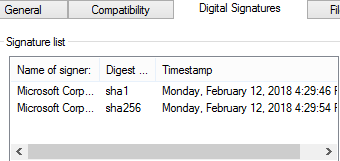
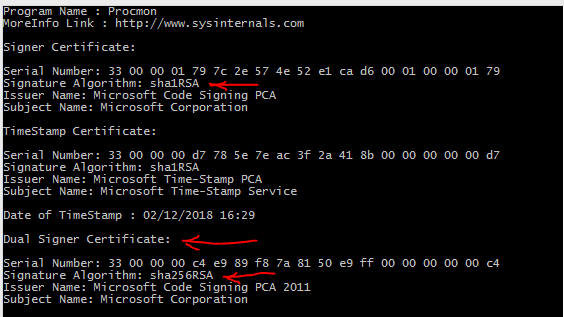
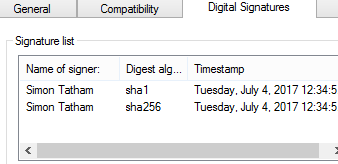
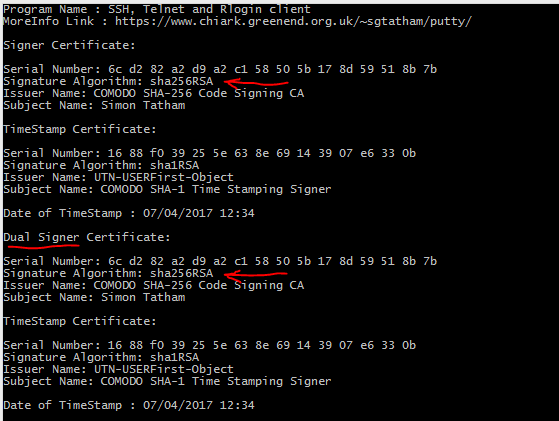
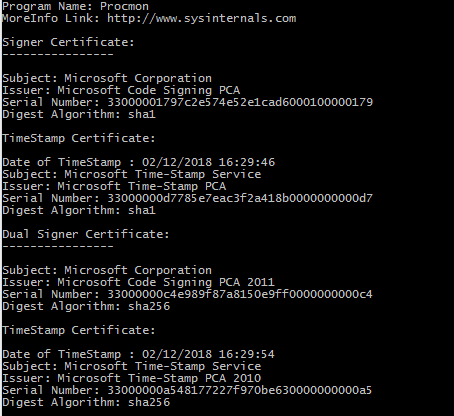
PrintDualSignatureInfofunction. Do I not? Can you show what you mean in code? – Iden